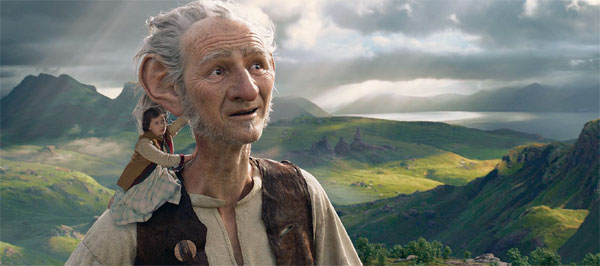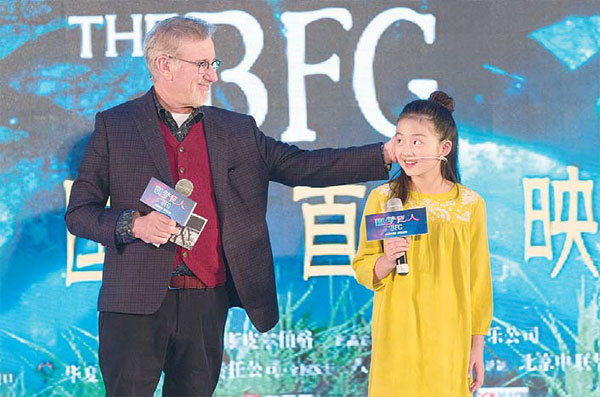Close encounter of the Spielberg kind
Updated: 2016-10-21 07:12
By Raymond Zhou(China Daily Europe)
|
|||||||||
Legendary Hollywood director shares his behind-the-scenes stories and filmmaking insights
Steven Spielberg is often perceived as a symbol of Hollywood - both for those who love it and those who revile it.
"I'm proud to be a member of the Hollywood filmmaking community. I never take offense when someone says, 'You're a Hollywood guy,'" says the director of The BFG, who sat down for a rare one-on-one interview with China Daily during a promotional tour in China for the new movie.
"When I was a kid, I wanted to go to Hollywood and make movies. It's the end of the rainbow. It's Oz for me," he says, giving examples of serious movies that do not seem to be profit-driven but are funded and made in Hollywood.
|
The BFG, directed by Steven Spielberg, is being shown in mainland theaters from Oct 14. Provided to China Daily |
|
Steven Spielberg with Huang Yici, a voice actress for The BFG. Feng Yongbin / China Daily |
Some commentators say Spielberg toned down the darkness in the original children's book written by Roald Dahl when he adapted The BFG for the big screen.
Spielberg says there is still a lot of darkness in the movie version. There is a great message in the book about the dangers of bullying, he says, which the movie has kept. But he didn't find the book "too dark" when he read it to his children when they were little.
However, you don't need to have read the book to enjoy the movie as it provides back stories for the main characters. It may actually encourage moviegoers to go and pick up the book.
I ask him about how he manages audience expectations - between those who love him for his existing work and those who want their favorite filmmakers to constantly reinvent themselves.
In response, he clearly separates his movies into two categories - the type where doesn't know of, or care about, audience reaction and those for which he tries to think from the audience's point of view.
The former he says he makes for himself and isn't sure at all whether they will be popular. However, for movies like the Indiana Jones franchise, he is "not ashamed" that he actively anticipates audience reaction.
"As I get older, my films have become more personal. I'm a little less attentive to audience needs and more about what I'm feeling at this time in my life," he says.
Schindler's List and Saving Private Ryan were "surprise hits" that he didn't make with the box office in mind. He also includes Lincoln in that list.
"I've also had a lot of unhappy surprises," he says, which is the nature of the film business as he sees it.
I ask him about the most difficult films he has made, and again he mentions Schindler's List and Saving Private Ryan.
"When the subject matter is so emotional that I cannot create a distance between myself and the story I'm telling and we lose our objectivity, we become almost too invested emotionally in what we're doing."
On the set of Schindler's List, in Poland where the some of the greatest horrors of the Holocaust had taken place, not a day went by without someone breaking down or cast members being unable to continue, he recalls.
Spielberg credits the making of socially-conscious films like Lincoln with the maturity which comes with age.
"I couldn't have made those movies when I was younger."
He had acquired the rights to the book, Schindler's List, in 1982. He waited a decade before making it because he was still "too happy" and hadn't yet become a father.
"I had to reach a point in my life where I could throw out the bag of entertainment tricks before I could do it honestly and authentically."
Spielberg says he tries to find actors who are naturals.
"When I cast Ruby Barnhill for the role of Sophie, she was already Sophie," he says of the girl in The BFG. "I didn't direct her so that she would be self-conscious. I didn't want to do anything to get in the way of the magic she was bringing to the character."
Directing her, he only explained to her how movies were made but didn't talk much about the character.
"I let her invent her own character.
"The best a director can do with kids is not to direct," Spielberg insists.
He usually needs "fewer takes" with an untrained youngster than with trained movie stars, he adds.
Talking about superstars like Tom Hanks and Leonardo DiCaprio, Spielberg says they love challenges. They seek roles that bring out parts of themselves they are unfamiliar with and might even scare them. When Hanks started out on Bridge of Spies, he admitted he didn't know how to play his character. But he found the character when shooting started.
Asked about Daniel Day-Lewis, who famously stays in character even when not shooting, Spielberg says he was an utter professional while making Lincoln but did not discuss his craft.
"He just kept his Lincolnian accent. I felt I spent three-and-half months with Abraham Lincoln. When the shoot was over, he started talking like himself again. And I cried, because I missed Abraham Lincoln."
All the great actors he has worked with have had their own process, technique and talisman, according to Spielberg, "and I didn't get into that, because it's personal".
About Mark Rylance, a theater veteran who won an Academy Award for his supporting role in Bridge of Spies, Spielberg says he noticed a kindness in him and a twinkle in his eyes, which made him perfect for the role of the friendly giant in The BFG.
Theater actors are the most prepared and most open to change because in theater you may get new lines after the 20th performance, he adds.
While I agree that filmmakers graduate from fun entertainment to serious fare, I tell Spielberg it surprises me to see him "switch gears" in the same year and make two completely different movies.
His answer: "It's therapy."
After making a dark film, he needs a relief, something light and frolicking like Catch Me If You Can to get the heavy stuff out of his system before he finds something for "the other side of myself" and tells stories with social meaning.
I ask him what movies he wanted to make but somehow has yet to make and he cites the quintessential robot movie. He would also love to do a song-and-dance musical.
raymondzhou@chinadaily.com.cn
(China Daily European Weekly 10/21/2016 page18)
Today's Top News
UK's May tries to reassure EU on Brexit
Lawmakers stage walkout to protest anti-China acts
Syrian army declares 3-day truce in Aleppo
BBC report on Terracotta Warriors refuted
Iraqi forces recapture more villages around Mosul
Greeks rally against labor reforms
Iraqi forces fighting all out to free Mosul from IS
Chinese pupils flock to UK independent schools
Hot Topics
Lunar probe , China growth forecasts, Emission rules get tougher, China seen through 'colored lens', International board,
Editor's Picks

|

|

|

|

|

|









